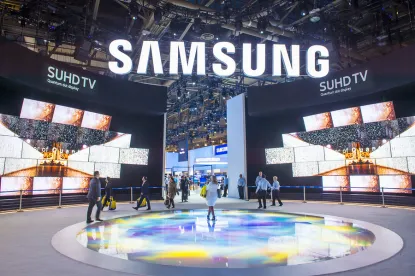The US Court of Appeals for the Federal Circuit issued a rare grant of two mandamus petitions directing the US District Court for the Western District of Texas to transfer the underlying patent infringement actions to the US District Court for the Northern District of California pursuant to 28 U.S.C. § 1404(a). In re: Samsung Elecs. Co., Ltd., Case Nos. 21-139, -140 (Fed. Cir. June 30, 2021) (Dyk, J.)
Ikorongo Technology owned four patents directed to functionalities allegedly performed by applications running on the accused mobile products sold by Samsung and LG. Ikorongo Technology assigned to Ikorongo Texas—an entity formed only weeks before—exclusive rights to sue for infringement of those patents within specified parts of the state of Texas, including certain counties in the Western District of Texas, while retaining the rights to the patents in the rest of the United States.
Ten days later, Ikorongo Texas sued Samsung and LG in the Western District of Texas. Although Ikorongo Texas claimed to be unrelated to Ikorongo Technology, the operative complaints indicated that the same five individuals owned both Ikorongo Texas and Ikorongo Technology, and that both entities shared office space in North Carolina.
The day after filing the initial complaints, Ikorongo Texas and Ikorongo Technology filed first amended complaints, this time naming both Ikorongo Technology and Ikorongo Texas as co-plaintiffs, noting that together Ikorongo Texas and Ikorongo Technology owned the entire right, title and interest in the asserted patents, including the right to sue for past, present and future damages throughout the United States and the world.
Samsung and LG separately moved under 28 U.S.C. § 1404(a) to transfer the suits to the Northern District of California, arguing that “three of the five accused third-party applications were developed in Northern California, where those third parties conduct significant business activities and no application was developed or researched in Western Texas.” Samsung and LG also argued that potential witnesses and sources of proof were located in the Northern District of California.
The district court first concluded that Samsung and LG failed to establish § 1404(a)’s threshold requirement that the complaints “might have been brought” in the Northern District of California. Because Ikorongo Texas’s rights under the asserted patents were limited to the state of Texas and could not have been infringed in the Northern District of California, the district court held that venue over the entirety of the actions was improper under § 1400(b), which governs venue in patent infringement cases. Alternatively, the district court analyzed the traditional public- and private-interest factors, finding that defendants had not met their burden to show cause for transfer. Samsung filed for mandamus to the Federal Circuit.
The Federal Circuit found that the district court erroneously disregarded Ikorongo Technology and Ikorongo Texas’s attempts to manipulate venue when analyzing venue under § 1404(b). While no act of infringement of Ikorongo Texas’s geographically bounded rights took place in the Northern District of California, the Federal Circuit determined that “the presence of Ikorongo Texas is plainly recent, ephemeral, and artificial—just the sort of maneuver in anticipation of litigation that has been routinely rejected” by Supreme Court and Federal Circuit precedent.
The Federal Circuit found several facts compelling in its finding that the Ikorongo plaintiffs manipulated venue:
-
Ikorongo Texas was created and assigned its targeted geographic rights in the month leading up to the lawsuits
-
Both Ikorongo Technology and Ikorongo Texas were commonly owned and shared the same office
-
Nothing would prevent the Ikorongo entities from undoing the assignment if they so desired
-
Ikorongo Texas did not appear to conduct any other business and seemed to exist solely to limit venue to the Western District of Texas
Because courts are not bound by a plaintiff’s efforts to manipulate venue, the Federal Circuit found that it “need not consider separately Ikorongo Texas’s geographically bounded claims.” Disregarding the venue manipulation, the Court found that Ikorongo Technology could have filed suit in the Northern District of California. Therefore, under a proper construction of § 1404(a), the cases “might have been brought” in the Northern District of California.
The Federal Circuit also found a clear abuse of discretion in the district court’s balancing of convenience against judicial economy under § 1404. First, the Court found that the district court assigned too little weight to the relative convenience of the Northern District of California. While the parties identified no witnesses residing in Texas, evidence showed that more than a dozen third-party witnesses and two named inventors resided in Northern California. In weighing the willing witness factor as only slightly favoring transfer to the Northern District of California, the district court gave no weight to the presence of possible party witnesses in Northern California and erroneously discounted the convenience of third-party witnesses by presuming that “only a few” non-party witnesses would likely testify at trial. Even if not all witnesses testified, with nothing on the other side of the ledger, the Court found that this factor strongly favored transfer.
Second, the Federal Circuit found that the district court overstated the concern about waste of judicial resources and risk of inconsistent results in light of the plaintiffs’ separate infringement suit against another defendant in the Western District of Texas. Because the separate infringement suit involved entirely different underlying applications, the cases likely will result in significantly different discovery, evidence, proceedings and trial. Thus, the Court found that “the incremental gains in keeping these cases in the Western District of Texas simply are not sufficient to justify overriding the inconvenience to parties and witnesses.”
Third, contrary to the district court’s declaration that “it is generally a fiction that patent cases give rise to local controversy or interest,” the Federal Circuit found that significant factors—e.g., that the third parties’ applications running on defendants’ accused product were researched, designed and developed in Northern California—gave the Northern District of California a legitimate interest in adjudicating the cases “at home.” Thus, the Court found that the other public interest factors favored transfer.



 />i
/>i
